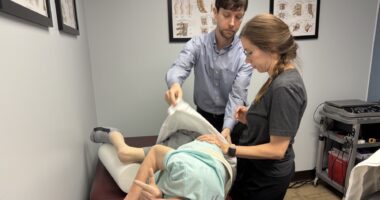Dosing begins in Phase 2 study of NMD670 for SMA type 3

A first patient has been dosed in a Phase 2 clinical trial evaluating the safety and efficacy of NMD670, an oral treatment candidate for spinal muscular atrophy (SMA) type 3, its developer, NMD Pharma, announced.
Called SYNAPSE-SMA (NCT05794139), the trial is now recruiting adults, ages 18 to 60, who have a diagnosis of SMA type 3 and are able to walk. The study will be conducted at seven locations across the U.S. and Europe.
NMD670 is designed to help increase muscle function and strength in people with neuromuscular disorders, collectively known as NMD for short.
“This represents a significant milestone for NMD Pharma as we further expand our pipeline into new indications, and I look forward to keeping the patient communities and market updated as we progress,” Thomas Holm Pedersen, NMD Pharma’s CEO, said in a press release.
Jorge A. Quiroz, executive vice president and chief medical officer at NMD Pharma, noted that the therapy candidate “has already been shown to be safe and efficacious in a proof of mechanism study in patients with myasthenia gravis (MG),” and added, “We are confident that it could also be beneficial for the treatment of patients affected by SMA.”
Treatment aims to improve patients’ muscle function, strength
In SMA, mutations in the SMN1 gene coding for a protein called SMN cause motor neurons — the nerve cells that control muscle movement — to die over time. This results in muscle weakness and wasting, leading to difficulty breathing, eating, or moving.
“SMA is a rare neuromuscular disorder characterised by severe muscle weakness and fatigue that greatly affects the quality of life of patients and their families,” Quiroz said.
There are five main types of SMA, which start at different ages. In type 3, a milder form of SMA, symptoms usually appear after 18 months of age. While most patients are able to stand and walk without help, some may lose the ability to walk as the disease progresses.
NMD670 is a small molecule designed to inhibit the ClC-1 ion channel, a protein that helps muscles to relax. The protein is found only in muscles that control movement. By inhibiting it, NMD670 is expected to lead to gains in muscle function and strength in patients.
The trial is enrolling up to 54 adults who have a genetic diagnosis of SMA and 3-5 copies of SMN2, a so-called back-up gene that makes up for less than about 10% of all SMN in the body. All patients must be able to walk at least 50 meters (about 165 feet) without walking aids.
Upon entry into the study, patients are randomly assigned to receive either oral NMD670 or a placebo, given twice daily for 21 days, or about three weeks. Then, the two groups are switched, with those on NMD670 receiving a placebo, and vice versa.
The trial will evaluate NMD670’s safety, efficacy, tolerability, and pharmacokinetics, or how a medicine moves through the body.
Its main goal is to compare changes in the distance walked in six minutes with NMD670 versus a placebo. Secondary goals include measures of muscle strength and performance, finger dexterity, and side effects and suicidal ideation.
Findings from a small Phase 1/2 clinical study (CHDR1948) in healthy volunteers and people with myasthenia gravis showed that NMD670 appeared to be safe and well tolerated, and to increase muscle strength and function.
“Building on the impact from our current genetically targeted disease-modifying therapies, NMD670 may help to restore muscle strength and function,” said Kenneth Hobby, president of Cure SMA, a U.S.-based nonprofit.
The post Dosing begins in Phase 2 study of NMD670 for SMA type 3 appeared first on SMA News Today.


